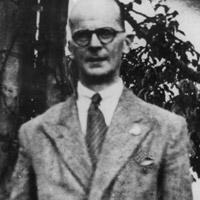John Reginald Halliday Christie
| John Christie | |
|---|---|
 |
|
| Born |
John Reginald Halliday Christie 8 April 1899 Northowram, West Riding of Yorkshire, England |
| Died | 15 July 1953 (aged 54) Pentonville Prison, London, England |
| Cause of death | Execution by hanging |
| Other names | The Rillington Place Strangler |
| Criminal penalty | Death sentence |
| Conviction(s) | Murder |
| Killings | |
| Victims | 8+ |
|
Span of killings
|
24 August 1943 – 6 March 1953 |
| Country | England |
|
Date apprehended
|
31 March 1953 |
John Reginald Halliday Christie (8 April 1899 – 15 July 1953), known to his family and friends as Reg Christie, was an English serial killer active during the 1940s and early 1950s. He murdered at least eight people – including his wife, Ethel – by strangling them in his flat at 10 Rillington Place, Notting Hill, London. Christie moved out of Rillington Place during March 1953, and soon afterwards the bodies of three of his victims were discovered hidden in an alcove in the kitchen. Two further bodies were discovered in the garden, and his wife's body was found beneath the floorboards of the front room. Christie was arrested and convicted of his wife's murder, for which he was hanged.
Two of Christie's victims were Beryl Evans and her baby daughter Geraldine, who, along with Beryl's husband, Timothy Evans, were tenants at 10 Rillington Place during 1948-49. This case sparked huge controversy after Timothy Evans was charged with both murders, found guilty of the murder of his daughter and hanged in 1950. Christie was a major prosecution witness; when his own crimes were discovered three years later, serious doubts were raised about the integrity of Evans's conviction. Christie himself subsequently admitted killing Beryl Evans, but not Geraldine; it is now generally accepted that Christie murdered both Beryl and Geraldine and that police mishandling of the original inquiry, as well as their incompetence during searches at the house, allowed Christie to escape detection and enabled him to murder four more women. The High Court, when overturning the conviction in the Evans case during the 2000s, accepted that Evans did not murder either his wife or his child, and that a miscarriage of justice therefore occurred when Timothy Evans was hanged.
In an official inquiry conducted in 1965-66, Mr Justice (Sir Daniel) Brabin concluded that it was "more probable than not" that Evans killed his wife but that he did not kill his daughter, Geraldine. This finding, challenged in subsequent legal processes, enabled the Home Secretary to grant Evans a posthumous pardon for the murder of his daughter during October 1966. The case contributed to the 1965 suspension of capital punishment for murder in the United Kingdom.
...
Wikipedia
